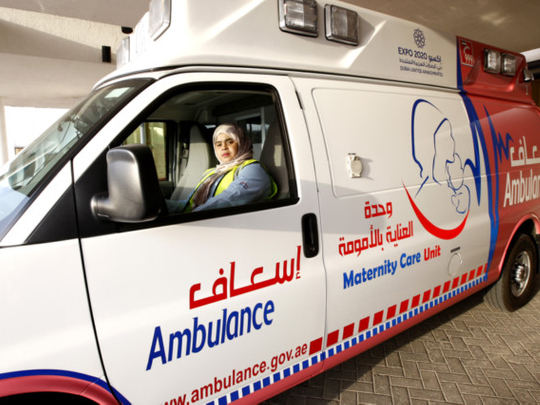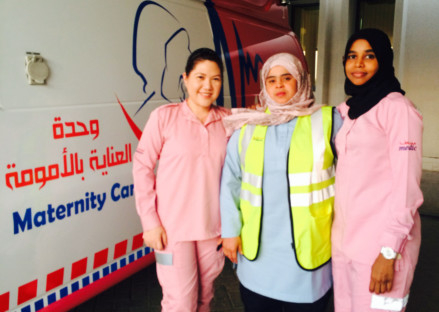
Dubai: It’s 2am when Zainab Juma Ali Hassan, 37, receives a 999 radio call on her walkie talkie about an accident at Al Garhoud.
This is the fifth call in the day. But her response is always enthusiastic and alert.
Attired in her phosphorescent green uniform, boots and all, she is aware of keeping to her response time of under seven minutes. She wastes no time as she swings behind the blue and pink ambulance wheel, and manoeuvres her way deftly with her team of paramedics to reach the site in a record five minutes, reaching the critically injured victims with timely help.
This is a typical day in the life of Zainab, a driver with the Dubai Corporation for Ambulance Services (DCAS), responding to a maximum of five emergency calls in a 12-hour work shift that either begins at 5am and ends at 5pm or begins at 5pm and ends at 5am the next day.
Zainab, an Emirati, who began her career driving a taxi, joined DCAS six years ago and is thrilled to get a community service spin to her career.
“I get great satisfaction in helping really sick and injured people and am glad I took up ambulance driving,” says Zainab, who is originally from Dubai, studied at Al Hudaiba School and is one of the chief breadwinners for her family comprising her parents and sisters.
It is unusual for Emirati women to take up such a hands-on job like driving an ambulance. Incidentally, Dubai is the only emirate in the UAE that has a fleet of five women drivers since 2008 of which four are Emiratis.
Zainab loves her job and recalls how she got into it: “Six years ago when I heard that DCAS was looking to recruit women ambulance drivers I immediately applied because I felt it would be a noble profession to join. They gave me a week’s training in first aid and administering CPR and I was in. We — the two paramedics Maria Jill and Fatima Khalid and I — work as a team and we are like family now as together we have handled many emergency situations and understand each other perfectly well.”
Zainab explains the nature of her job: “As an all woman-team we are expected to first respond to maternity cases, home accident cases and come to the aid of female victims of road accidents. However, we also assist male patients or road accident victims if we happen to be the closest to rush to their aid. Typically our response time has to be under seven minutes and I always try to reach quicker than that. I recall in the case of an accident victim at Oud Metha, I actually reached with the ambulance within one minute. Once we reach there, depending on the seriousness of the injury, the paramedics grade the patients. The code is green for someone with non–life-threatening injuries, yellow for serious injuries, red for critical injuries and black for dead. I am not afraid of seeing blood or extensive injuries. I think in the six years of service I have seen plenty and steeled myself,” explains Zainab who is known to never be intimidated by traffic and never loses her cool.
“As ambulance drivers we are trained to drive quickly but safely. We are always taught that our safety comes first. So even in cases where I have to cross a red traffic light, I first ensure that my team and I are safe,” says Zainab who enjoys an excellent rapport with the other four women drivers – Mariam, Ayesha, Aisha and Nujood.
In the last six years Zainab can recall several occasions where she was able to successfully save lives. “Two weeks ago about seven labourers were involved in a traffic accident just outside Latifa Hospital. That is our work centre so we were the first to reach. When men are too heavy to carry on stretchers, we women also appeal to bystanders to help and we do get a good response.
“About a month ago there was a terrible automobile accident involving five women where a car had skidded and rolled over near Karama. There were four casualties and one person was seriously injured. While the paramedics are completely trained to handle the situation, we drivers are trained in critical thinking and are able to double up in providing first aid or mouth-to-mouth resuscitation,” she explains.
Despite the long duty hours and challenges, Zainab says she would never trade her job for another. “It is thrilling and gives me a sense of working for my community. I love my job and am proud to do this for my country,” she adds.













